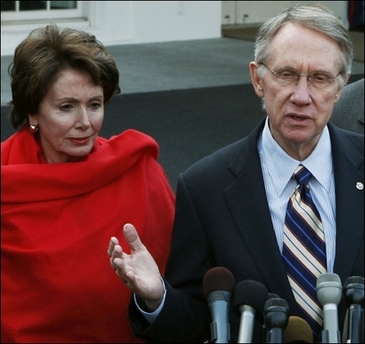Analysis: Bush speech draws lines
(AP)Updated: 2007-01-11 13:35
WASHINGTON - US President Bush's announcement that he is sending more troops to Iraq sets up the first major test of wills between his Republican administration and the new Democratic-controlled Congress. Both sides are digging in.
Democrats, who came to power in midterm elections two months ago in large part because of growing public opposition to the war, must walk a fine line between criticizing Bush's plans and appearing to be obstructionists or undermining the military.
And they presently rule Congress with insufficient numbers to block Bush's plan.
For Bush, the decision to send more troops to Iraq - rather than begin a withdrawal of combat forces as recommended last month by the bipartisan Iraq Study Group - is a huge gamble.
If it fails, he will have few if any options left.
Defying public opinion polls and the newly empowered Democratic leadership, Bush on Wednesday moved to send 21,500 more US troops to Iraq while saying it was a mistake not to have had more forces there previously.
He recognized the risks ahead. "Even if our new strategy works exactly as planned, deadly acts of violence will continue and we must expect more Iraqi and American casualties," Bush said in Wednesday's address to the nation. But, he added, "to step back now would force a collapse of the Iraqi government, tear that country apart, and result in mass killings on an unimaginable scale,"
Democrats served notice they would challenge his plan, with aggressive hearings that begin on Thursday and with votes in both the House and Senate in the coming days on a nonbinding measure opposing any increase in troops.
"American voters expect us to help get us out of Iraq," said Democratic Sen. Joseph Biden of Delaware, chairman of the Foreign Relations Committee and a 2008 presidential hopeful.
Congress voted in October 2002 by wide margins to authorize Bush to take military action in Iraq. That authority stands.
Since they now run Congress, even though by thin majorities, Democrats also now share with the president some responsibility over the unpopular war.
Despite their vows to carefully scrutinize Bush's troop increase, their near-term options are limited.
While it's true that Congress controls the government's purse strings, politically about the most it can do is hold hearings and pass symbolic resolutions.
If, even if with the help of some Republicans, Congress is able to pass legislation, such as that proposed this week by Sen. Edward M. Kennedy, D-Mass., to require Bush to get congressional approval before sending more troops to Iraq, Bush will surely veto it.
And, given the slim margin of Democratic control, such a veto would almost certainly be sustained.
"The Democrats may control Congress but they can't block the president this time without potentially being accused of losing the war. I think an awful lot of this is staging for the next time," the 2008 presidential and congressional elections, said Anthony Cordesman, an Iraq expert at the Center for Strategic and International Studies.
For Bush, many dangers lurk in the new plan.
The new troops might not be enough to stabilize the country. Prime Minister Nouri al-Maliki might not rise to Bush's challenge to do more in controlling sectarian violence and shutting down private militias. The new US troops could present more targets to militants.
"We have to succeed. We must succeed. The consequences of failure are catastrophic in the region," said Sen. John McCain, R-Ariz., who has long advocated more troops.
Furthermore, Bush risks losing more and more Republican support, which in turn would hasten his lame-duck status. Next week's votes are, in part, a strategy to divide Republicans by forcing them to take a public stand on the war.
"At this point, the battle lines have been drawn pretty deeply. And the concrete is setting," said Stephen Wayne, a professor of government at Georgetown University. "I regard this as a last gasp for the president to try to get a successful resolution of the Iraq quagmire."
Both parties are divided on what to do next.
More and more Republicans are trying to distance themselves from Bush and the war.
And Democrats are divided on how far to go in fighting Bush's plan or in pressing for troop withdrawals, even as the party's liberal base pressures them to do more to bring troops home.
"If the question is whether Congress would cut off funds, the answer is no. But you had an election in November that was widely interpreted as a rejection of the president's war policy," said John Isaacs, president of the Council for a Livable World, an arms control advocacy group.
"While Americans are not sure about how to get out, and only a small proportion back immediate withdrawal, they certainly aren't inclined to support a new increase, an escalation," said Isaacs.
Before his speech, Bush personally briefed both Democratic and Republican leaders on details of his plan. The leaders emerged in agreement on just one thing that Americans are understandably skeptical and that the war so far has gone badly.
Then, they respectively sounded what are sure to be battle themes for the coming days.
Senate Majority Leader Harry Reid and House Speaker Nancy Pelosi renewed their opposition to additional troops. But, said Reid, "We as senators have had no ability to have any input in the president's position on this."
House Minority Leader John Boehner, R-Ohio, said the plan might be distasteful to some but he called it "our best shot at victory in Iraq."
|
||
|
||
|
|

